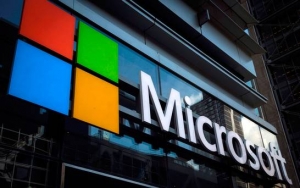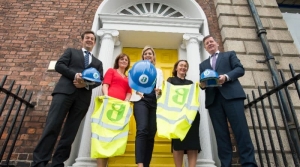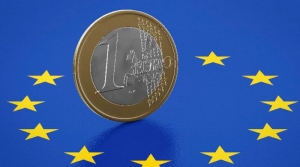Microsoft forced to build Dublin power station to service huge data centre
Tech giant Microsoft is being forced to build its own power station in Dublin to provide electricity to one of its huge data centres because the local transmission network hasn't been upgraded quickly enough to meet a surge in demand. EirGrid, the semi-State company that controls the country's electricity transmission network, has warned that more temporary power generation may be required in Dublin until a huge upgrade of the system in the capital is completed. Microsoft, co-founded by Bill Gates, intends to install 16 gas-powered generators at a site in Clondalkin, in the west of the capital. The power generation compound is designed to provide up to 18 megawatts of electricity to just one of its huge data centres at the site.
Such electricity output would be enough to power the equivalent of about 18,000 homes. The Grange Castle Business Park in Clondalkin is already home to other data centres operated by Microsoft, and internet giant Google and other companies. The concentration of data centres there, and their relatively rapid deployment, has placed enormous strain on the local electricity network.
The Electricity Supply Board said yesterday that one large data centre can consume as much electricity as a large regional town such as Drogheda and that the growth in electricity demand because of new and planned data centres is "unprecedented". Microsoft has four operational data centres in Grange Castle. Last year, it secured planning permission to build four more on the site that will probably cost in the region of €900m to build.
EirGrid confirmed that the infrastructure in and around the Grange Castle Business Park is now struggling to meet the data centre power demand. "Space at Grange Castle Business Park is in high demand from international business customers," an EirGrid spokesman told the Irish Independent. "To accommodate this growth, further power is required to meet both current electricity needs and to plan for future electricity demand."
He said that in the next few weeks, EirGrid is embarking on a major project to reinforce the electricity transmission system in the west of Dublin.
Called the 'West Dublin Project', the scheme will see tens of millions of euro spent to construct a new substation to meet the energy demand from data centres in the area. But it won't be completed until 2019. "Given the lead times associated with transmission reinforcements, generation capacity or equivalent may need to be available in the Dublin region to accommodate this additional demand in the short term," added the EirGrid spokesman.
A Microsoft spokesperson insisted that its new power compound would only provide temporary power to its data centre "if necessary". An ESB Networks spokesman pointed out there are currently five large substations in Dublin, and apart from the new Grange Castle substation, another new facility is being built at Belcamp, north of the city.
Microsoft and other companies including Amazon, Google and Facebook have invested billions of euro in data centres here over the past number of years. But last year, the boss of Microsoft Ireland, Cathriona Hallahan, raised concerns with the Government regarding the security of energy supply in Ireland to facilitate the continued deployment of such facilities in the country. The data centre operations are used by Microsoft as cloud computing hubs.
"A key driver for electricity demand in Ireland for the next number of years is the connection of large data centres," said the EirGrid spokesman. "A significant proportion of this extra data centre load will materialise in the Dublin region."
Guaranteed Irish Highlights Key Challenges for Construction Sector
Brexit, skilled labour shortages, and the slow progress in implementing sustainable housing policies are key challenges facing suppliers to the construction sector, according to Guaranteed Irish.
The business membership organisation held a ‘construction roundtable’ in Dublin this morning (11.09.17) to hear directly from members about the challenges they face and the steps needed to achieve sustainable construction in future years. Attendees at the event called for accelerated infrastructure and housing programmes; VAT reductions; and simpler planning laws to stimulate the construction sector.
Guaranteed Irish has over 300 members nationwide, including leading construction-industry suppliers, such as CRH, Tegral, Wavin, Kingspan, Combilift, Celuplast, Dulux, Fleetwood, Kilsaran and Camfil.
Survey Findings
In advance of today’s event, Guaranteed Irish surveyed its construction-supplier members, with the results showing:
◾36% feel Brexit is posing a major challenge to their business;
◾28% feel problems in the broader housing sector are impacting on their work;
◾12% are concerned by a lack of skilled labour and associated recruitment difficulties.
Commenting today, Brid O’Connell, CEO of Guaranteed Irish, said: “Almost two-thirds of our construction-sector members export, and they are heavily dependent on the British and Northern Ireland markets. It comes as no surprise, then, that Brexit is the main area of concern for most members.
“This manifests itself in different ways: some operate in sterling, so are concerned by plummeting exchange rates. Others are located in border counties, so are anxious about the prospect of a hard border. With others, their main challenge is the uncertainty brought about by Brexit, and not knowing what to expect in future years.”
In relation to issues in the broader housing sector, Ms. O’Connell said Guaranteed Irish will work proactively with government to ensure the sector is stimulated and developed in a more sustainable way.
“Our survey showed our members are hampered by rising costs in the construction sector, as well as the fact that insufficient numbers of houses are being built. Lack of balanced growth in the regions was also highlighted as a concern, as was the difficulty in accessing finance for working capital,” she said.
“Members are concerned by talk of another property bubble emerging. What they really want is balanced development within the sector, rather than the ‘peak and trough’ trends we witnessed in previous decades.”
Recommendations for Government
Attendees at today’s event included representatives from the Construction Industry Federation, Ibec and the Irish Hardware Association, as well as Guaranteed Irish member companies. All attendees were invited to share their views and suggestions on how to stimulate the construction sector and achieve sustainability in future years.
"Our members have decades of experience in supplying the construction sector, and managed to withstand the recession of recent years and maintain employment in their local communities,” said Ms. O’Connell.
“Now, they’re keen to play their part in addressing current housing challenges and providing solutions for government in this regard. The recommendations put forth at our roundtable today will be formulated into a policy paper for government, and we intend to present this to members of the Oireachtas later this month. We see ourselves very much as ‘think tank’, and we hope the Government will draw on our members’ experiences and expertise in formulating future policies.”
Guest Speakers
Jim Clery, Head of Real Estate with KPMG, chaired the roundtable event. Summarising the key recommendations put forth by Guaranteed Irish members, he said: “The construction sector wants to see government making it easier to build.
“With Brexit looming, infrastructure and housing programmes must be accelerated. To overcome our dependency on the UK and drive growth in the sector, we must stimulate activity here. The Guaranteed Irish companies present today put forward a range of recommendations on how best to achieve this, including through VAT reductions for critical supplies, acceleration of infrastructure and speeding up the planning process.”
Maria Bailey TD, Chair of the Joint Oireachtas Committee on Housing, Planning, Community and Local Government, was the special guest at today’s event. Other speakers included: ◾Paddy Kelly, MD of Tegral, the leading building products manufacturer; ◾Marian Finnegan, Chief Economist, Sherry FitzGerald Group; and ◾Jacqui Hanratty, National Sales Manager, and Pamela McCabe, Marketing Manager, of building materials company Kingspan.
Today’s event took place as part of Guaranteed Irish’s ‘Construction Month’. Throughout September, the organisation is highlighting the contribution its construction-industry members make to the Irish economy and the local communities in which they are based. Further information is available at www.guaranteedirish.ie
EIB unveils €300m Irish lending programme
Companies across Ireland are set to benefit from a new €300 million long-term lending programme announced by the European Investment Bank (EIB). The new company financing scheme marks the first ever direct lending by the EIB to Irish midcap firms.
New cooperation with Ibec was also formally agreed that will further build on the strengthened commitment of the European Investment Bank to support private sector investment in Ireland.
The Minister for Finance and Public Expenditure and Reform, Paschal Donohoe T.D., highlighted that “This ground-breaking initiative from the EIB will provide a significant investment boost to midcap companies based in Ireland. Previously, the EIB’s direct loan offerings in Ireland would have focused on larger corporates. However, with this programme the EIB is specifically targeting and directly lending to smaller, midcap size companies. This initiative follows on from my meeting with the EIB President in June and is evidence of the ever closer cooperation with the EIB which was committed to at the opening of the Dublin office last December. This programme will enable midcaps to widen and complement their financial sources, stimulating investment in the Irish economy which is all the more welcome in the face of the challenges from Brexit.”
"Ibec CEO Danny McCoy stated: “Irish business has been the driving force behind the economic recovery. Today’s agreement is another step towards improving the competitiveness of companies in Ireland and ensuring their continued growth. We are delighted to enter into a promotional partnership with the EIB. The EIB’s new lending programme for Irish business is a welcome source of new and alternative investment. This programme, and the deeper cooperation between Ibec and the EIB, demonstrates the EIB’s continued commitment to the Irish market. We are looking forward to working with them to improve the business environment for Irish companies. The announcement comes at an opportune time for Irish business owners, providing them with greater certainty in the face of challenges from Brexit.”
“The European Investment Bank recognises the crucial contribution of midcap firms to economic growth and employment across Europe. Following today’s Dublin launch the EIB Group is rolling out a number of new financing initiatives to support companies across Ireland seeking to expand and build on new business opportunities. This new Midcap lending programme complements the EIB’s traditional support for transformational infrastructure in Ireland, and the partnership with Ibec agreed today will pave the way for stronger engagement in the years to come.” said Andrew McDowell, European Investment Bank Vice President.
Details of the new Ireland Midcap Programme Loan were outlined to business leaders at a workshop at Ibec headquarters in Dublin. Company representatives were able to discuss financing challenges and investment requirements with senior EIB corporate finance experts and hear first hand from a number of Irish companies whose investment has been supported by the EIB in recent years.
Under the new streamlined lending initiative companies active across a range of sectors, and looking to expand activity, will be able to access new financing from the European Investment Bank. Individual loans will provide financing at cheaper rates and much longer tenors than traditionally available.
The partnership between the EIB and Ibec aims to provide improved promotion and information on new small business and midcap financing programmes, tailored for the specific needs of Irish businesses.
Prior to the Ibec event Andrew McDowell formally agreed a new EUR 20 million investment in ACT Venture Capital’s latest fund, ACT V, by the European Investment Fund, part of the EIB Group. This is expected to lead to overall investments of more than EUR 90 million for primarily Irish SMEs looking to expand internationally.
The European Investment Bank is the world’s largest international public bank, owned directly by the European Union member states. Over the last decade the EIB has provided more than EUR 1.2 billion for investment by Irish companies, including credit lines with SBCI, AIB, Bank of Ireland, Ulster Bank and Rabobank.
https://www.irishbuildingmagazine.ie/2017/09/08/eib-unveils-e300m-irish-lending-programme/
45% of Enterprise Ireland construction firms have reduced exposure to the UK following Brexit
A new survey – Export Market Watch – has found that since the Brexit vote, nearly half (45%) of Enterprise Ireland construction firms have reduced their exposure to the UK, with almost seven in 10 firms surveyed now viewing the Eurozone as providing key opportunities for growth.
The new publication by Enterprise Ireland, in conjunction with Investec, is designed to help support the global ambitions of Irish firms by providing insights into developments across the country’s major export markets, as well as the outlook for exchange rates, to support their diversification plans. In this quarter’s report, Enterprise Ireland and Investec look at the prospects for the Irish construction sector internationally.
Construction sector
Despite 45% of respondents having taken steps to cut their UK exposure since last year’s Brexit referendum, the UK is still identified as the country with the best near-to-medium term opportunities by Irish construction companies.
For those retaining a presence in the UK, currency volatility is a key issue for construction companies looking to price and tender longer-term projects. Respondents indicated that they are increasingly looking to mitigate currency risks through sourcing more UK suppliers, while others have introduced more conventional currency and raw materials hedging tactics. Key opportunity areas identified in the UK are largely around housing, ‘Build to Rent’ schemes and public infrastructure.
New markets, particularly the Eurozone, will grow in terms of importance in the next few years for companies who provide specialist data centre and pharmaceutical plant construction expertise. While 52% of firms currently do business with the Eurozone, 69% view it as offering attractive opportunities for them. However, only one in three companies believe that they currently have sufficient resources in place to expand into new markets and market knowledge is cited as the highest barrier to entry.
"Stephen Hughes, Head of Construction at Enterprise Ireland said: “From an export perspective, construction exports by Enterprise Ireland clients are at an all-time high and many construction companies that diversified during the downturn, are now well positioned to capitalise on global growth in key markets."
“We can see that the constraints of moving into a new market identified by our respondents are multifaceted. Equipping construction firms with the skills to overcome these challenges will likely deliver tangible benefits, with 72% of respondents saying that they would increase their employee numbers if they move into new markets. Enterprise Ireland has developed its Eurozone Strategy, and is providing Building Information Modelling (BIM) training, to help equip such companies to build scale and expand their reach in this important marketplace.”
Global construction markets
The findings of the Export Market Watch reveal that further momentum in the US residential construction market and strong consumer confidence in Ireland, Germany and the Netherlands are the key areas of opportunity for the construction industry. However, there are also clear signs that the UK construction activity has lost momentum with construction activity just +0.9% higher year-on-year.
Stephen added: “There are a number of areas of particular strength in the Eurozone at this time, including: data centres; pharmaceutical facilities and healthcare infrastructure. Positively, these are all segments that Irish firms have expertise in so establishing and maintaining local relationships is a must for new entrants to these markets.
“We have also noticed Irish firms taking more interest in expanding in the US market in the wake of the Brexit vote. This marketplace offers plentiful opportunities, particularly in residential property, data centre construction and healthcare.”
Market outlook for exchange rates
Investec said that with most of the key scheduled political events of 2017 now behind us, the focus on FX markets is shifting back to economic fundamentals from political developments. A combination of the diminution of perceptions of political risks and a brighter economic growth outlook for the Eurozone have contributed to a strengthening of the single currency.
Export and exchange rate performance
Irish exports have made a very strong start to 2017, with nominal goods exports increasing 7% year-on-year in the year to June 2017, according to the CSO. Helped by this momentum, the trade surplus has widened by 16% year-on-year to €25.1 billion in the same period.
Philip O’Sullivan, Chief Economist with Investec commented: “With eight successive above-50 readings, the export component of the Investec Services PMI report for Ireland suggests that, similar to goods, the strong momentum in this area should continue. The progress is particularly encouraging given some recent adverse currency movements from an Irish perspective, most notably from sterling”.






